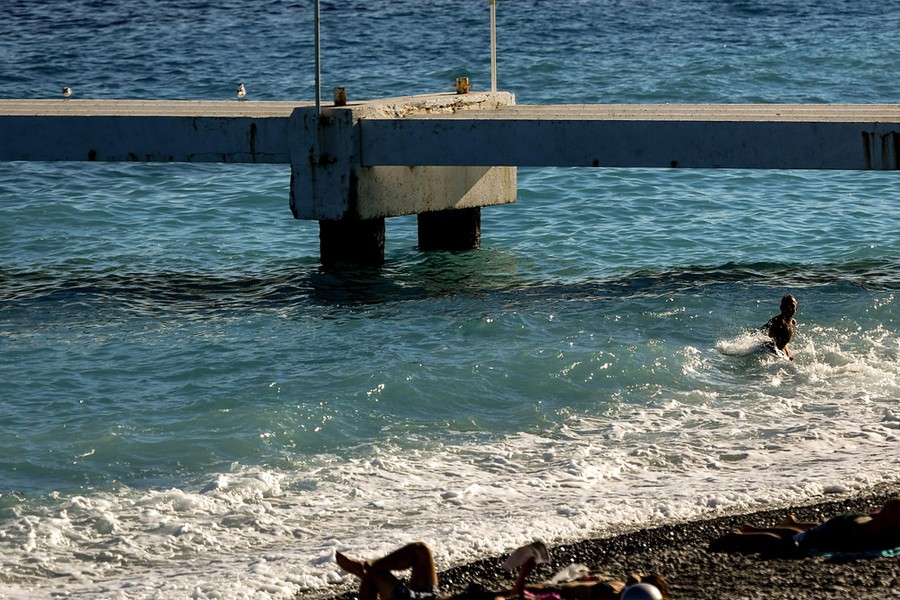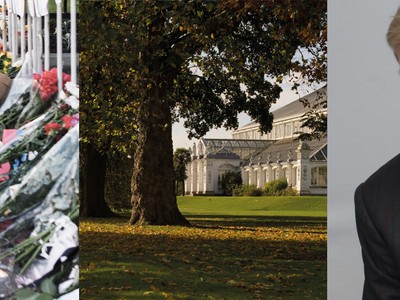“If the tyrants close the door of migration (to Syria) in your faces, then open the door of jihad in theirs and turn their actions against them,” said an audio clip from an ISIS spokesman, referring to Western governments’ efforts to keep foreign fighters from traveling to join IS.
As if in response, people at a Florida gay nightclub were mown down one evening. The next night a mad man attacked German commuters with an axe, then an 84-year-old French priest had his throat cut on the altar of a Normandy church. That some of these attacks happened in small places like Ansbach only heightened the pervasive insecurity.
With armed soldiers patrolling amidst children building sandcastles on the beaches of St Tropez people across Europe wondered whether this would be the new normal. In France and Germany, rucksacks are banned from beaches, nightclubs and the Oktoberfest. One could easily envisage a dystopia in which we all go about in our underwear under the gaze of heavily armoured policemen, were we not reminded of an underpants bomber trying to blow up a trans-Atlantic flight.
Professional contrarians like the Guardian’s Sir Simon Jenkins routinely explain that ‘the only fear is fear itself’ which is scant consolation as we eye others warily on public transport. More seriously, experts on ISIS say that as the Caliphate lost ground (20% in Syria and 40% in Iraq) so it would re-oxygenate itself through asymmetric strikes in the West, though unlike Al Qaeda, hitting the ‘far enemy’ has never been a core ISIS priority next to the goal of a physical state under Sharia law.
In addition to nine overseas territories where ISIS has affiliates, from the Caucasus via Nigeria to Pakistan, ISIS has a presence in forty countries. As many as 30,000 foreigners have joined ISIS, of whom a quarter are from Europe and Turkey. Security sources estimate that 5,000 have returned to Europe. If 24/7 surveillance of each individual (and a much wider pool of suspects) involves up to 30 people, the numbers are overwhelming, and choices of who to watch result in mistakes, as we have seen in France.
The public needs to see that serious measures are being adopted
Dealing with such a threat is not straightforward. For sure, much can be done to make public places more physically resilient, though whether we wish to pass through metal detectors into bars, offices or shops as we do at airports is a moot point.
So-called ‘lone wolves’ and ‘wolf packs’ are much harder to interdict than embedded terror cells, for the time between conception and execution of an attack is shorter, and if no bombs are involved, there is less of a logistical trail to intercept – and ‘lone wolves’ do not email or make phone calls to co-conspirators that can be intercepted either.
Although we have stringent laws restricting bulk purchase of fertilisers or peroxide, that does not apply to household knives. While gun laws make it hard to acquire automatic weapons, there is an underworld market in guns, whether on the back streets of Brussels or the ‘dark net’, and laws on decommissioned weapons are still lax. My belief in claims by the Met’s head of counterterrorism that guns are very hard to obtain in London were somewhat undermined in July when passing gangbangers had a gun battle in our Kennington square which saw two rounds go through a neighbour’s window.
All terrorism strives for publicity. This can result in a copycat effect, especially if 40% of ‘lone wolves’ have a history of mental illness, including many of this summer’s perpetrators. This is why some French media groups have elected to give dead terrorists no publicity by not even mentioning their names. A large number of recent attacks have also involved people with criminal records, radicalised in prisons. In my opinion, how Islamists are confined should be the priority of the new British government.
Enhanced CCTV coverage of cities is more useful to investigation of past incidents than in preventing them, for the operators have
no knowledge of psychological profiling of the sort one can see in any Israeli departure lounge. Few Arab malefactors, for example, could pronounce my surname correctly, the only question I’ve ever been asked at Tel Aviv border control. In Europe we seem to prefer dull technology to street smarts. Where technology can play a pre-emptive part is in rapidly processing not only the names of refugees from Syria (there is a vast backlog in Germany) but in generating questions that only a Syrian from Aleppo or Idlib could answer. Some 14% of alleged migrants from Syria are not Syrian at all.
On a macro level, there are inarguable cases for banning any foreign funding of mosques, notably from such agencies as the Islamic University of Medina, while we should also refuse admittance to every Saudi ‘clerical diplomat’. Their activities have been especially deleterious in West Africa. For, as the political climate in France shows, unless we wish to see angry populists replacing centrist politicians, the public needs to see that serious measures are being adopted.
Michael Burleigh is a historian and writer and has a regular column in the Daily Mail.


